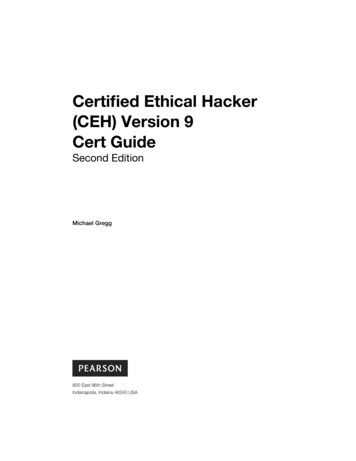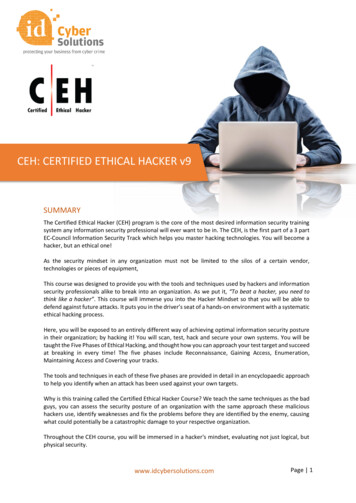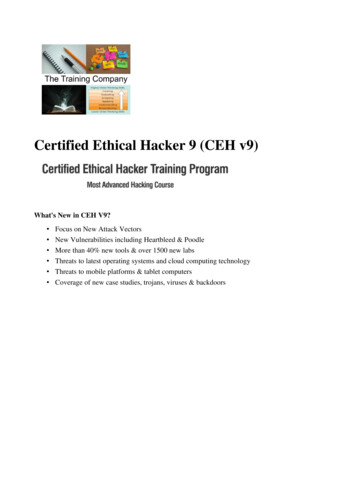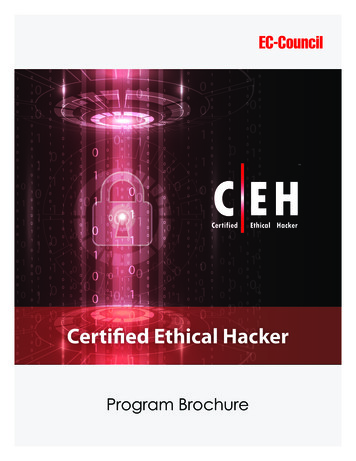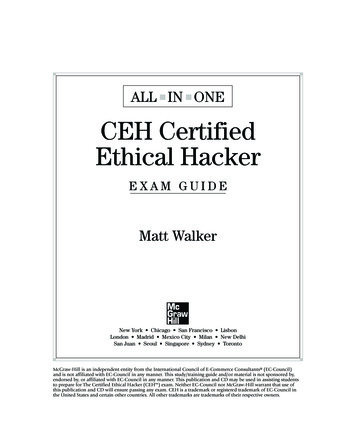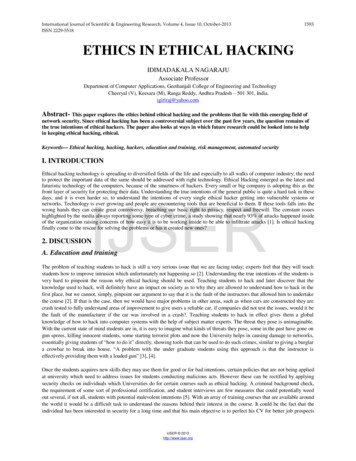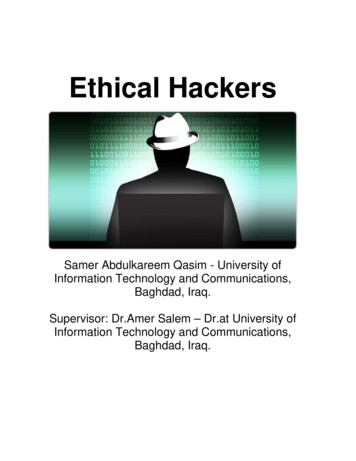
Transcription
Ethical HackersSamer Abdulkareem Qasim - University ofInformation Technology and Communications,Baghdad, Iraq.Supervisor: Dr.Amer Salem – Dr.at University ofInformation Technology and Communications,Baghdad, Iraq.
Introduction to Ethical HackingEthical hackers, or penetration testers, have been around for along time, but because of increases in cybercrime andregulations over the last decade, they have become more popularthan in the past. The realization is that finding weaknesses anddeficiencies in systems and addressing them proactively is lesscostly than dealing with the fallout that comes after the fact. Inresponse, organizations have sought to create their ownpenetration testing teams internally as well as contract withoutside experts when and if they are needed.Taking on the skillset associated with ethical hacking willquickly and effectively put you into the role of evaluatingenvironments to identify, exploit, report, and recommendcorrective actions to be taken in respect to threats andvulnerabilities. Note, however, that pentesters usually do notdo corrective actions because that is something that the clientmust decide to perform or not, but in some cases the client mayask you do so.Through a robust and effective combination of technological,administrative, and physical measures, these organizationshave learned to address their given situation and head off majorproblems wherever and whenever possible. Technologies suchas virtual private networks (VPNs), cryptographic protocols,intrusion detection systems (IDSs), intrusion preventionsystems (IPSs), access control lists (ACLs), biometrics, smartcards, and other devices have helped security. Administrativecountermeasures such as policies, procedures, and other ruleshave also been strengthened and implemented over the pastdecade. Physical measures include cable locks, device locks,alarm systems, and similar devices. Your new role as an ethicalhacker will deal with all of these items, plus many more.
Hacking: the EvolutionHacker is one of the most misunderstood and overused termsin the security industry. Everyone from the nightly news toauthors to Hollywood and the rest of the media uses the termfrequently. Thanks to overuse of the term and the fact that it isalmost constantly attached to activities that are shady or evencriminal in nature, the general public looks at anyone with thelabel hacker as up to no good. Hackers are viewed as thoseoperating in the shadows, antisocial and antiestablishment inmany cases. Other members of the public have even come toembrace hackers as the new social activists thwartingpoliticians, governments, large corporations, and others.Newsworthy events by loosely organized groups such asAnonymous and Lizard Squad have contributed to the publicperception of the hacker.Types of HackersThe following are categories of hackers:Script Kiddies These hackers have limited or no training andknow how to use only basic techniques or tools. Even then theymay not understand any or all of what they are doing.White-Hat Hackers These hackers think like the attackingparty but work for the good people.They are typically characterized by having a code of ethics thatsays essentially they will cause no harm. This group is alsoknown as ethical hackers or pentesters.Gray-Hat Hackers These hackers straddle the line betweengood and bad and have decided to reform and become the goodside. Once they are reformed, they still might not be fullytrusted.
Black-Hat Hackers These hackers are the bad guys whooperate on the opposite side of the law. They may or may nothave an agenda. In most cases, black-hat hacking and outrightcriminal activity are not far removed from each other.Suicide Hackers These hackers try to knock out a target toprove a point. They are not stealthy, because they are notworried about being caught or doing prison time.So, What Is an Ethical Hacker?Ethical hackers are employed either through contracts or directemployment to test the security of an organization. They use thesame skills and tactics as a hacker but with permission from thesystem owner to carry out their attack against the system. Inaddition, ethical hackers do not reveal the weaknesses of anevaluated system to anyone other than the system owner.Finally, ethical hackers work under contract for a company orclient, and their contracts specify what is off-limits and whatthey are expected to do. Their role depends on the specific needsof a given organization. In fact, some organizations keep teamson staff specifically to engage in ethical hacking activities.What are the advantages of ethical hacking?The advantages of ethical hacking include, protecting thegovernment’s computer systems from terrorism and nationalsecurity breaches. Keeping your computer system safe frommalicious hackers from gaining access is also important. Havingenough security measures in place to prevent criminals gettinginto your network will help.
This is an example from IBM. One of the first examples ofethical hackers at work was in the 1970s, when the United Statesgovernment used groups of experts called red teams to hack itsown computer systems. According to Ed Skoudis, Vice Presidentof Security Strategy for Predictive Systems’ Global Integrityconsulting practice, ethical hacking has continued to grow in anotherwise lackluster IT industry, and is becoming increasinglycommon outside the government and technology sectors where itbegan. Many large companies, such as IBM, maintain employeeteams of ethical hackers.What are the disadvantages of ethical hacking?With ethical hacking there is a dark side, were the ethical hackercould use the information they get, to damage the company. Suchas put the company’s financial and banking records on theinternet. Or put a virus, malware, or even a logic bomb where aprogrammer hides a piece of code, where it will go of at a certaindate or time. Here are some attempted attacks.On 29 October 2008, a logic bomb was discovered at American,mortgage giant Fannie Mae. The bomb was allegedly planted byRajendrasinh Babubhai Makwana, an Indian citizen and ITcontractor who worked in Fannie Mae’s Urbana, Marylandfacility. The bomb was set to activate on 31 January 2009 andcould have wiped all of Fannie Mae’s 4000 servers. Makwanahad been terminated around 1:00pm on 24 October 2008 andmanaged to plant the bomb before his network access wasrevoked. Makwana was indicted in a Maryland court on 27January 2009 for unauthorized computer access.
In October 2009, Douglas Duchak was terminated from his jobas data analyst at the TSA’s Colorado Springs Operations Centre(CSOC). Surveillance cameras captured images of Duchakentering the facility after hours loading a logic bomb onto aCSOC server that stored data from the U.S. Marshals. In January2011, Duchak was sentenced to two years prison, 60,587 infines, and three years’ probation. At his sentencing, Duchaktearfully apologized as his lawyer noted that at the time of theincident, Duchak’s wife was pregnant with their second child.The judge at the sentencing mentioned that this logic bombplanting “incident was an anomaly in an otherwise untarnishedwork history.What do ethical hackers do?Apart from the regular pen tester duties, ethical hackers areassociated with other responsibilities. The main idea is toreplicate a “real hacker” at work and instead of exploiting thevulnerabilities for malicious purposes, seek countermeasures toseal it. A real hacker might employ all or some of these strategiesto penetrate a system:- Scanning ports and seeking vulnerabilities: An ethical hackeruses port scanning tools like Nmap, Nessus to scan one’s ownsystems and find open ports. The vulnerabilities with each of theports can be studied and remedial measures can be taken.- An ethical hacker will examine patch installations and makesure that they cannot be exploited.
-The ethical hacker can engage in social engineering concept like‘Dumpster diving’. The essence of ‘dumpster diving’ is torummage through the trash bins for passwords, charts, anysticky notes with crucial information that can be used to generatean attack. To thwart these types of attacks, organizations alwaysinsist on employees to shred unwanted paper work and disposeunwanted media appropriately.- An ethical hacker can also employ other social engineeringtechniques like ‘shoulder surfing’ to gain access to crucialinformation or play the “kindness card” to trick employees topart with their passwords.- An ethical hacker will see if he/she can evade IDS (IntrusionDetection systems), IPS (Intrusion Prevention systems),honeypots and firewalls. In addition to this, an ethical hacker canemploy other strategies like sniffing networks, bypassing andcracking wireless encryption, and hijacking web servers and webapplications, they have to deal with issues related to laptop theftand employee fraud.Detecting how well the organization reacts to all of these tacticsis proof of the strength of security policy and securityinfrastructure of the organization. An ethical hacker attacks theperimeter defenses as well as the social engineering aspects of anorganization as a real hacker will do.
Bad Guys and Good Guys, or Hackers and EthicalHackersThe difference between an ethical hacker and a hacker issomething that can easily get you into an argument. Just sayingthe word hacker in the wrong place can get you into an hourslong conversation of the history of hacking and how hackers areall good people who mean nothing but the best for the world.Others will tell you that hackers are all evil and have nothing butbad intentions. In one case I was even told that hackers wereoriginally model-train enthusiasts who happened to likecomputers.You must understand that for us, hackers are separated byintentions. In our worldview hackers who intend to cause harmor who do not have permission for their activities are consideredblack hats, whereas those who do have permission and whoseactivities are benign are white hats. Calling one side good andthe other bad may be controversial, but in this book, we willadhere to these terms:Black Hats They do not have permission or authorization fortheir activities; typically, their actions fall outside the law.White Hats They have permission to perform their tasks.White hats never share information about a client with anyoneother than that client.Gray Hats These hackers cross into both offensive anddefensive actions at different times.Another type of hacker is the hacktivist. Hacktivism is anyaction that an attacker uses to push or promote a politicalagenda. Targets of hacktivists have included governmentagencies and large corporations.
How to Become a White Hat HackerA white hat hacker, or ethical hacker, uses penetration testingtechniques to test an organization's IT security and to identifyvulnerabilities. IT security staff then uses the results of suchpenetration tests to remediate vulnerabilities, strengthen securityand lower an organization's risk factors.Penetration testing is never a casual undertaking. It involves lots ofplanning, which includes getting explicit permission frommanagement to perform tests, and then running tests as safely aspossible. These tests often involve the very same techniques thatattackers use to breach a network for real.Background and Education RequirementsWhite hat hacking involves a great deal of problem solving, as wellas communication skills. A white hat hacker also requires a balanceof intelligence and common sense, strong technical andorganizational skills, impeccable judgement and the ability toremain cool under pressure.At the same time, a white hat needs to think like a black hat hacker,with all of their nefarious goals and devious skills and behavior.Some top-rate white hat hackers are actually former black hathackers who got caught, and for various reasons decided to leave alife of crime behind and put their skills to work in a positive (andlegal) way.
There is no standard education criteria for a white hat hacker —every organization can impose its own requirements on thatposition — but a bachelor's or master's degree in informationsecurity, computer science or even mathematics can provide astrong foundation.For those who aren't college bound, a military background,especially in intelligence, can help your resume get noticed by hiringmanagers. Military service is also a plus for employers who requiresecurity clearances.Pertinent CertificationsA number of white hat hacking and security-related IT certificationscan help a candidate get a foot in the door, even without copiousamounts of hands-on experience.Achieving the Certified Ethical Hacker (CEH) certification from theEC-Council is one recommended starting point. The CEH is avendor-neutral credential, and CEH certified professionals are inhigh demand. The median salary of an ethical hacker is about 72,000, according to PayScale, and the top range can climb to wellhigher than 100,000. On the consulting side, the EC-Council statesthat CEH professionals can expect to be paid 15,000 to 45,000per assignment.The intermediate-level CEH credential focuses on system hacking,enumeration, social engineering, SQL injection, Trojans, worms,viruses and other forms of attack, including denial of service (DoS).Candidates must also demonstrate knowledge of cryptography,penetration testing, firewalls, honeypots and more.
The EC-Council recommends a five-day CEH training class forcandidates without prior work experience. To do well in the course,students should have Windows and Linux systems administrationskills, familiarity with TCP/IP and working knowledge ofvirtualization platforms. However, self-study options are alsoavailable to help candidates pass the single required exam. Be awarethat the EC-Council requires candidates to have at least two years ofinformation security experience and to pay a 100 application fee.Becoming a certified white hat hacker also involves staying on thelegal side o
- An ethical hacker will see if he/she can evade IDS (Intrusion Detection systems), IPS (Intrusion Prevention systems), honeypots and firewalls. In addition to this, an ethical hacker can employ other strategies like sniffing networks, bypassing and cracking wireless encryption, and hijacking web servers and web applications, they have to deal with issues related to laptop theft and employee .


